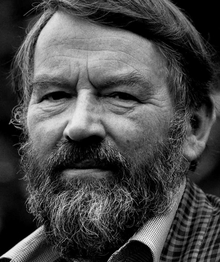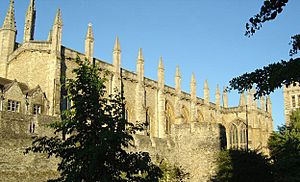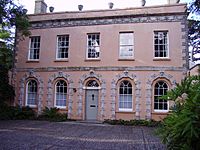John Fowles facts for kids
Quick facts for kids
John Fowles
|
|
|---|---|
 |
|
| Born | 31 March 1926 Leigh-on-Sea, Essex, England |
| Died | 5 November 2005 (aged 79) Lyme Regis, Dorset, England |
| Occupation | Writer, teacher |
| Alma mater | University of Edinburgh New College, Oxford |
| Period | 1960–2005 |
| Notable works | The Collector The Magus The French Lieutenant's Woman |
John Robert Fowles (born 31 March 1926 – died 5 November 2005) was a famous English writer. His books are known all over the world. He was influenced by writers like Jean-Paul Sartre and Albert Camus.
After studying at Oxford University, Fowles taught English on a Greek island called Spetses. This trip inspired his book The Magus (1965), which became very popular. Another famous book was The French Lieutenant's Woman (1969). This story was set in Victorian times in Lyme Regis, England, where Fowles lived for many years. Some of his other books include The Ebony Tower (1974), Daniel Martin (1977), and A Maggot (1985).
Many of Fowles's books have been translated into different languages. Several of them have also been made into movies.
Contents
About John Fowles
His Early Life and Family
John Fowles was born in Leigh-on-Sea, Essex, England. He was the only son of Robert John Fowles and Gladys May. His father worked for a tobacco company. His mother's family came from Cornwall. They moved to Essex for a healthier climate.
School Days and University

As a child, John Fowles went to Alleyn Court Preparatory School. In 1939, he earned a spot at Bedford School. He was a good student and a talented athlete. He played rugby, fives, and was captain of the cricket team.
After school, Fowles joined a special naval course at the University of Edinburgh. He trained to become an officer in the Royal Marines. He finished his military service in 1947.
Then, Fowles went to New College, Oxford. He studied French and German, but later focused on French. At Oxford, he started to think about becoming a writer. He was especially interested in the ideas of writers like Jean-Paul Sartre and Albert Camus. These writers explored ideas about freedom and how the world can sometimes seem confusing.
Teaching Career and Inspiration
After Oxford, Fowles worked as a teacher. He spent a year teaching at the University of Poitiers in France. Then, he decided to take a job at a school in Greece.
In 1951, Fowles became an English teacher at a school on the Greek island of Spetses. This time was very important for him. He met his future wife there. His experiences on the island inspired him to write The Magus. He loved living in Greece and wrote many poems. In 1953, he and other teachers were dismissed for trying to make changes at the school. Fowles then returned to England.
While in Greece, Fowles met Elizabeth Christy. They later married on 2 April 1957. Fowles became a stepfather to Elizabeth's daughter, Anna. For almost ten years, he taught English to students from other countries in London.
Becoming a Full-Time Writer

In 1960, John Fowles started writing The Collector. He finished the first draft quickly. The book was published in 1963 and became a big success. It sold for a very high price for a first novel.
Because The Collector was so popular, Fowles was able to stop teaching. He could now focus on writing full-time. His book was even made into a movie in 1965.
In 1965, Fowles moved to a farm near Lyme Regis, Dorset. This farm inspired a setting in his next book, The French Lieutenant's Woman (1969). Later, he and his wife moved to Belmont, a house in Lyme Regis. This house also appeared in The French Lieutenant's Woman.
The movie version of The Magus came out in 1968. It was not very popular. However, The French Lieutenant's Woman (1969) was a huge success. It was translated into many languages and made Fowles famous around the world. This book was also made into a movie in 1981, starring Meryl Streep.
John Fowles lived in Lyme Regis for the rest of his life. He continued to write many books, including The Ebony Tower (1974), Daniel Martin (1977), and A Maggot (1985). In 2008, The Times newspaper in the UK named him one of the 50 greatest British writers since 1945.
Community and Personal Life
Fowles was the curator of the Lyme Regis Museum from 1979 to 1988. He sometimes got involved in local politics, writing letters to support historical preservation. Even with this involvement, he was generally a private person.
In 1990, his first wife, Elizabeth, passed away from cancer. This was a very difficult time for him, and he did not write for a year. In 1998, Fowles married his second wife, Sarah Smith. He passed away on 5 November 2005, at the age of 79, due to heart failure.
List of Works
- (1963) The Collector
- (1964) The Aristos, essays (non-fiction)
- (1965) The Magus (revised in 1977)
- (1969) The French Lieutenant's Woman
- (1973) Poems by John Fowles
- (1974) The Ebony Tower
- (1974) Shipwreck
- (1977) Daniel Martin
- (1978) Islands
- (1979) The Tree
- (1980) The Enigma of Stonehenge
- (1982) A Short History of Lyme Regis
- (1982) Mantissa
- (1985) A Maggot
- (1985) Land (with Fay Godwin)
- (1990) Lyme Regis Camera
- (1998) Wormholes - Essays and Occasional Writings
- (2003) The Journals – Volume 1
- (2006) The Journals – Volume 2
See also
In Spanish: John Fowles para niños
 | Charles R. Drew |
 | Benjamin Banneker |
 | Jane C. Wright |
 | Roger Arliner Young |

